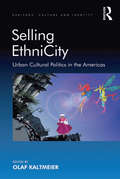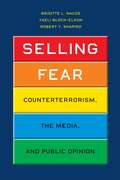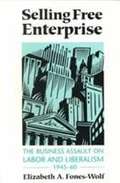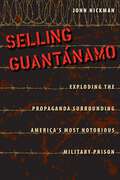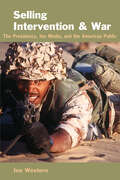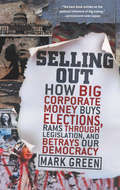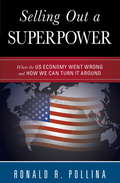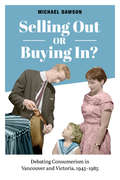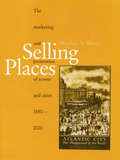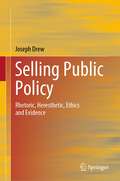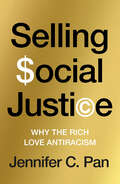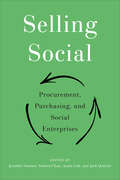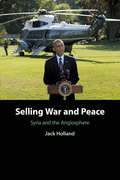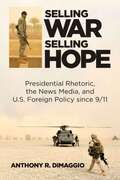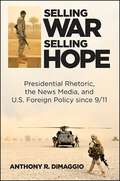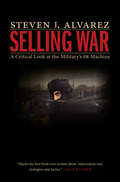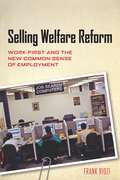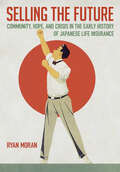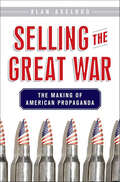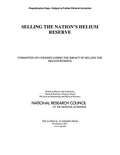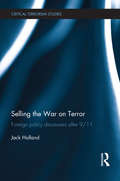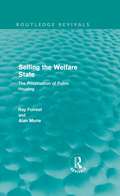- Table View
- List View
Selling EthniCity: Urban Cultural Politics in the Americas (Heritage, Culture and Identity)
by Olaf KaltmeierBringing together a multidisciplinary team of scholars, this book explores the importance of ethnicity and cultural economy in the post-Fordist city in the Americas. It argues that cultural, political and economic elites make use of cultural and ethnic elements in city planning and architecture in order to construct a unique image of a particular city and demonstrates how the use of ethnicized cultural production - such as urban branding based on local identities - by the economic elite raises issues of considerable concern in terms of local identities, as it deploys a practical logic of capital exchange that can overcome forms of cultural resistance and strengthen the hegemonic colonization of everyday life. At the same time, it shows how ethnic communities are able to use ethnic labelling of cultural production, ethnic economy or ethno-tourism facilities in order to change living conditions and to empower its members in ways previously impossible. Of wide ranging interest across academic disciplines, this book will be a useful contribution to Inter-American studies.
Selling Fear: Counterterrorism, the Media, and Public Opinion
by Robert Y. Shapiro Brigitte L. Nacos Yaeli Bloch-ElkonWhile we’ve long known that the strategies of terrorism rely heavily on media coverage of attacks, Selling Fear is the first detailed look at the role played by media in counterterrorism—and the ways that, in the wake of 9/11, the Bush administration manipulated coverage to maintain a climate of fear. Drawing on in-depth analysis of counterterrorism in the years after 9/11—including the issuance of terror alerts and the decision to invade Iraq—the authors present a compelling case that the Bush administration hyped fear, while obscuring civil liberties abuses and concrete issues of preparedness. The media, meanwhile, largely abdicated its watchdog role, choosing to amplify the administration’s message while downplaying issues that might have called the administration’s statements and strategies into question. The book extends through Hurricane Katrina, and the more skeptical coverage that followed, then the first year of the Obama administration, when an increasingly partisan political environment presented the media, and the public, with new problems of reporting and interpretation. Selling Fear is a hard-hitting analysis of the intertwined failures of government and media—and their costs to our nation.
Selling Free Enterprise: The Business Assault on Labor and Liberalism, 1945-60
by Elizabeth A. Fones-WolfExplores the following topic: PART 1 The Postwar Employer Counteroffensive PART 2 In the Factory PART 3 In the Community PART 4 Institutions PART 5 After the Merger
Selling Guantánamo: Exploding the Propaganda Surrounding America's Most Notorious Military Prison
by John HickmanIn the aftermath of 9/11, few questioned the political narrative provided by the White House about Guantánamo and the steady stream of prisoners delivered there from half a world away. The Bush administration gave various rationales for the detention of the prisoners captured in the War on Terror: they represented extraordinary threats to the American people, possessed valuable enemy intelligence, and were awaiting prosecution for terrorism or war crimes. Both explicitly and implicitly, journalists, pundits, lawyers, academics, and even released prisoners who authored books about the island prison endorsed elements of the official narrative. In Selling Guantánamo, John Hickman exposes the holes in this manufactured story. He shines a spotlight on the critical actors, including Rumsfeld, Cheney, and President Bush himself, and examines how the facts belie the “official” accounts. He chastises the apologists and the critics of the administration, arguing that both failed to see the forest for the trees.
Selling Intervention and War: The Presidency, the Media, and the American Public
by Jon WesternSelling Intervention and War examines the competition among foreign policy elites in the executive branch and Congress in winning the hearts and minds of the American public for military intervention. The book studies how the president and his supporters organize campaigns for public support for military action. According to Jon Western, the outcome depends upon information and propaganda advantages, media support or opposition, the degree of cohesion within the executive branch, and the duration of the crisis. Also important is whether the American public believes that military threat is credible and victory plausible. Not all such campaigns to win public support are successful; in some instances, foreign policy elites and the president and his advisors have to back off.Western uses several modern conflicts, including the current one in Iraq, as case studies to illustrate the methods involved in selling intervention and war to the American public: the decision not to intervene in French Indochina in 1954, the choice to go into Lebanon in 1958, and the more recent military actions in Grenada, Somalia, Bosnia, and Iraq. Selling Intervention and War is essential reading for scholars and students of U.S. foreign policy, international security, the military and foreign policy, and international conflict.
Selling Out
by Mark GreenWith CEOs and corporations under fire for years of outrageous deception and fraud, the time has come for Mark Green's groundbreaking book, Selling Out. A political watchdog and longtime crusader for better government, Green exposes the truth about the poisonous role money has come to play in our political culture. How are so many corporations able to buy political protection? Why do legislators pay more attention to contributors than to constituents? Filled with bold and practical solutions that are already working to return power to the American people, Selling Out is sure to inflame anyone who's stunned by the recent corporate scandals -- or who's curious about how so many have gotten away with so much for so long.
Selling Out a Superpower
by Ronald R. PollinaIn 1968, there were sixty-two lobbyists in Washington; today there are thirty-four thousand, outnumbering members of Congress and their staffers two to one. By 2008, these lobbyists were spending approximately $8.2 million for influence per day. Few, if any, of these lobbyists represent the majority of Americans in the middle class. So it's not surprising, given these statistics, that real median household income in America has stagnated for over a decade. This hard-hitting book documents that a combination of special interest groups and their army of money-peddling lobbyists, along with government mismanagement of business and the economy by both parties, have betrayed the American middle and lower classes for the last twenty years. The result is a host of misguided laws and policies that have driven jobs and whole industries offshore, never to return. The author takes issue with those who emphasize the potential benefits of globalization without taking notice of its many negative effects on American society. He also argues that inept policy threatens to derail the American economy permanently and that our economic malaise is more than a short-term reaction to a financial market collapse or global market forces. He cites critical areas where changes must be made to reverse the negative trend:* Improving our 1950s-era educational system to produce a workforce able to compete for 21st-century jobs.* Reform of tax codes that have been driving companies and jobs offshore. We are currently a nation that manufactures practically nothing!* Weaning all levels of government away from deficit spending, which drains economic power* Pursuing free trade that also means fair trade.* Ending the cycle of credit-card debt and all-too-easy mortgage credit to finance ultimately unaffordable lifestyles.* Making the United States more business friendly, so companies will grow and provide desperately needed jobs here at home.The author warns that unless we implement these and other recommended changes, the American economy will inevitably decline while China, India, and other up-and-coming nations ascend. He maintains that all is not lost. If we follow the course he sets, we can reinvigorate and renew our economy, rebuild America's greatness, create 21st-century jobs, and more. This book provides a roadmap for reclaiming American preeminence.
Selling Out or Buying In?: Debating Consumerism in Vancouver and Victoria, 1945-1985
by Michael DawsonUntil the late 1950s residents of Vancouver and Victoria negotiated a shopping landscape that would be unrecognizable to today’s consumers: most stores were closed for at least half the day on Wednesdays, prevented from opening during the evenings, and were banned from operating on Sundays. Since that decade, however, British Columbians, and Canadians generally, have made significant strides in gaining greater and easier access to consumer goods. Selling Out or Buying In? is the first work to illuminate the process by which consumers’ access to goods and services was liberalized and deregulated in Canada in the second half of the twentieth century. Michael Dawson’s engagingly written and detailed exploration of the debates amongst everyday citizens and politicians regarding the pros and cons of expanding shopping opportunities, challenges the assumption of inevitability surrounding Canada’s emergence as a consumer society. The expansion of store hours was a highly contested and contingent development that pitted employees, owners and regulators against one another. Dawson’s nuanced analysis of archival and newspaper sources reveals the strains that modern capitalism imparted upon the accepted and established rhythms of daily life.
Selling Places: The Marketing and Promotion of Towns and Cities 1850-2000 (Planning, History and Environment Series)
by Stephen WardSelling Places explores the fascinating development of the place marketing and promotion over the last 150 years, drawing on examples from Northern America, Britain and continental Europe. The processes involved and the promotional imagery employed are meticulously presented and richly illustrated.
Selling Public Policy: Rhetoric, Heresthetic, Ethics and Evidence
by Joseph DrewProfessor Drew’s latest work makes the case that even great public policy needs to be deliberately and strategically sold in order for it to ultimately be considered a success. However, it seems that most people charged with the task of selling public policy simply do not have the requisite skills to do so.Selling public policy is an art that draws on disparate strands of scholarship spanning the political sciences, economics, sociology, ethics and the classics. To perform the art of selling public policy one must first master the lessons from the greats in the field. Following this, it is necessary to learn how to apply the knowledge to real-world complex scenarios in such a way that the policy is indeed sold and stays sold over the implied returns period.This book is unique in the corpus of scholarly literature because it provides both the knowledge and real-world case studies required for students, scholars, and policy practitioners to master the art of selling public policy.
Selling Sex in Kenya: Gendered Agency under Neoliberalism
by Eglė ČesnulytėAs Kenyan women traditionally have fewer formal employment opportunities, often occupying lower-paid jobs in the informal sector, the experiences of women who earn money in unorthodox ways can offer revealing insights into the agency of women and its limits. Grounded in the narratives and life stories of women selling sex in Kenya, Eglė Česnulytė reveals the range of gendered and gendering effects that neoliberal policies have on everyday socio-political realities. By contextualising and historicising contemporary debates in the field, this important interdisciplinary study explores the societal structures that neo-liberal narratives and reforms influence, their gendered effects, and the extent to which individuals must internalise neoliberal economic logics in order to make or improve their living. In so doing, Česnulytė counters the prevailing male-dominated studies in political science to place women, and female-based narratives at the forefront.
Selling Social Justice: Why the Ruling Class Loves Antiracism
by Jennifer C. PanAmericans have been sold a version of social justice that fails to deliverThe national racial reckoning that began in 2020 promised to radically restructure American society from the bottom up. But five years on, it has mainly served to strengthen the ruling class and deliver the rich an opportunity to rehabilitate a profoundly unequal economic order precisely at a moment when the stability of the system and the public&’s trust in it are drastically deteriorating.Corporations have used antiracism to consolidate their political power and evade government regulation. Employers have surveilled and undermined workers through counterproductive diversity, equity, and inclusion trainings. Affluent professionals and Democratic politicians have exacerbated a stark class divide by pushing half-baked &“racial equity&” policies that come at the expense of the majority of working people. And the right has reacted to these developments by stoking a toxic culture war against &“wokeness&” that serves only as a distraction from the increasing economic hardship faced by Americans of all races.Selling Social Justice investigates the rise and spread of contemporary antiracist ideology and shows how the rich came to embrace this particular form of justice. In this provocative and thoroughly researched account, Jennifer C. Pan explores why, in a twenty-first-century economy of increasing scarcity, antiracism is the wrong frame for understanding and fighting inequality.
Selling Social: Procurement, Purchasing, and Social Enterprises
by Jack Quarter Andrea Chan Jennifer Sumner Annie LukSince the 2010s, all levels of governments in Canada have gradually initiated social procurement as a policy tool to further their social values and political agendas. Social enterprises of various shapes and sizes across the country have served as partners in the execution of those agendas. Selling Social examines the experiences of these enterprises in social procurement and social purchasing. Selling Social presents the findings of a three-year Canadian research project detailing experiences of work integration social enterprises (WISEs) selling their goods and services to organizational purchasers, including governments, businesses, and non-profit organizations. Drawing on survey findings and interviews, the book explores a diverse group of social enterprises from across Canada, showcasing their successes and their challenges based on real-life examples to aid social enterprises that are considering this path. The book emphasizes the importance of including social and environmental considerations in procurement and purchasing decisions, particularly at larger scales and through public policy. In doing so, Selling Social extends the understanding of social enterprises beyond their social and economic outcomes and into the broader movement towards responsible procurement and purchasing.
Selling War and Peace: Syria and the Anglosphere
by Jack HollandBy analysing Anglosphere foreign policy debates during the Syrian Civil War from 2011 to 2019, this book is a significant contribution to the literature in three fields. First, the book analyses the entirety of the Syrian Civil War in an innovative four-phase chronology, as the conflict evolved from calls for democracy, through chemical weapons concerns, to the rise of ISIL and the onset of Great Power proxy war. Second, the book maps and theorises Anglosphere foreign policy, charting the history and future of the US-UK-Australian military alliance during a key period of political uncertainty, defined by Donald Trump's presidency and the UK's Brexit negotiations. Third, the book develops a post-constructivist framework for the analysis of transnational political debates which determine war and peace in Syria and beyond. This framework emphasises the hard nature of soft power and the coercion of political opponents through forceful words.
Selling War, Selling Hope: Presidential Rhetoric, The News Media, And U. S. Foreign Policy Since 9/11
by Anthony R. DiMaggioDetails how presidents utilize mass media to justify foreign policy objectives in the aftermath of 9/11.
Selling War, Selling Hope: Presidential Rhetoric, the News Media, and U.S. Foreign Policy since 9/11
by Anthony R. DiMaggioModern presidents have considerable power in selling U.S. foreign policy objectives to the public. In Selling War, Selling Hope, Anthony R. DiMaggio documents how presidents often make use of the media to create a positive informational environment that, at least in the short term, successfully builds public support for policy proposals. Using timely case studies with a focus on the Arab Spring and the U.S. "War on Terror" in the Middle East and surrounding regions, DiMaggio explains how official spin is employed to construct narratives that are sympathetic to U.S. officialdom. The mass media, rather than exhibiting independence when it comes to reporting foreign policy issues, is regularly utilized as a political tool for selling official proposals. The marginalization of alternative, critical viewpoints poses a significant obstacle to informed public deliberations on foreign policy issues. In the long run, however, the packaging of official narrative and its delivery by the media begins to unravel as citizens are able to make use of alternative sources of information and assert their independence from official viewpoints.
Selling War: A Critical Look at the Military's PR Machine
by Steven J. AlvarezIn the spring of 2004, army reservist and public affairs officer Steven J. Alvarez waited to be called up as the U.S. military stormed Baghdad and deposed Saddam Hussein. But soon after President Bush’s famous PR stunt in which an aircraft carrier displayed the banner “Mission Accomplished,” the dynamics of the war shifted. Selling War recounts how the U.S. military lost the information war in Iraq by engaging the wrong audiences—that is, the Western media—by ignoring Iraqi citizens and the wider Arab population, and by paying mere lip service to the directive to “Put an Iraqi face on everything.” In the absence of effective communication from the U.S. military, the information void was swiftly filled by Al Qaeda and, eventually, ISIS. As a result, efforts to create and maintain a successful, stable country were complicated and eventually frustrated. Alvarez couples his experiences as a public affairs officer in Iraq with extensive research on communication and government relations to expose why communications failed and led to the breakdown on the ground. A revealing glimpse into the inner workings of the military’s PR machine, where personnel become stewards of presidential legacies and keepers of flawed policies, Selling War provides a critical review of the outdated communication strategies executed in Iraq. Alvarez’s candid account demonstrates how a fundamental lack of understanding about how to wage an information war has led to the conditions we face now: the rise of ISIS and the return of U.S. forces to Iraq.
Selling Welfare Reform: Work-First and the New Common Sense of Employment
by Frank RidziThe 1996 Welfare Reform Act promised to end welfare as we knew it. In Selling Welfare Reform, Frank Ridzi uses rich ethnographic detail to examine how new welfare-to-work policies, time limits, and citizenship documentation radically changed welfare, revealing what really goes on at the front lines of the reformed welfare system. Selling Welfare Reform chronicles how entrepreneurial efforts ranging from front-line caseworkers to high-level administrators set the pace for restructuring a resistant bureaucracy. At the heart of this remarkable institutional transformation is a market-centered approach to human services that re-framed the definition of success to include diversion from the present system, de-emphasis of legal protections and behavioral conditioning of poor parents to accommodate employers. Ridzi draws a compelling portrait of how welfare staff and their clients negotiate the complexities of the low wage labor market in an age of global competition, exposing the realities of how the new "common sense" of poverty is affecting the lives of poor and vulnerable Americans.
Selling a ‘Just’ War
by Michael J. ButlerButler sheds light on how American political leaders sell the decision to intervene with military force to the public and how a just war frame is employed in US foreign policy. He provides three post-Cold War examples of foreign policy crises: the Persian Gulf War (1990-91), Kosovo (1999), and Afghanistan (2001).
Selling the Future: Community, Hope, and Crisis in the Early History of Japanese Life Insurance
by Ryan MoranIn Selling the Future, Ryan Moran explains how the life insurance industry in Japan exploited its association with mutuality and community to commodify and govern lives. Covering the years from the start of the industry in 1881 through the end of World War II, Moran describes insurance companies and government officials working together to create a picture of the future as precarious and dangerous. Since it was impossible for individual consumers to deal with every contingency on their own, insurance industry administrators argued that their usage of statistical data enabled them to chart the predictable future for the aggregate. Through insurance, companies and the state thus offered consumers a means to a perfectible future in an era filled with repeated crises. Life insurance functioned as an important modernist technology within Japan and its colonies to instantiate expectations for responsibility, to reconfigure meanings of mutuality, and to normalize new social formations (such as the nuclear family) as essential to life. Life insurance thus offers an important vehicle for examining the confluence of modes of mobilizing and organizing bodies, the expropriation of financial resources, and the action of disciplining workers into a capitalist system.
Selling the Great War: The Making of American Propaganda
by Alan AxelrodThe riveting, untold story of George Creel and the Committee on Public Information -- the first and only propaganda initiative sanctioned by the U.S. government.When the people of the United States were reluctant to enter World War I, maverick journalist George Creel created a committee at President Woodrow Wilson's request to sway the tide of public opinion. The Committee on Public Information monopolized every medium and avenue of communication with the goal of creating a nation of enthusiastic warriors for democracy. Forging a path that would later be studied and retread by such characters as Adolf Hitler, the Committee revolutionized the techniques of governmental persuasion, changing the course of history. Selling the War is the story of George Creel and the epoch-making agency he built and led. It will tell how he came to build the and how he ran it, using the emerging industries of mass advertising and public relations to convince isolationist Americans to go to war. It was a force whose effects were felt throughout the twentieth century and continue to be felt, perhaps even more strongly, today. In this compelling and original account, Alan Axelrod offers a fascinating portrait of America on the cusp of becoming a world power and how its first and most extensive propaganda machine attained unprecedented results.
Selling the Nation's Helium Reserve
by National Research Council of the National AcademiesHelium has long been the subject of public policy deliberation and management, largely because of its many strategic uses and its unusual source-it is a derived product of natural gas and its market has several anomalous characteristics. Shortly after sources of helium were discovered at the beginning of the last century, the U.S. government recognized helium's potential importance to the nation's interests and placed its production and availability under strict governmental control. In the 1960s, helium's strategic value in cold war efforts was reflected in policies that resulted in the accumulation of a large reserve of helium owned by the federal government. The latest manifestation of public policy is expressed in the Helium Privatization Act of 1996 (1996 12 Act), which directs that substantially all of the helium accumulated as a result of those earlier policies be sold off by 2015 at prices sufficient to repay the federal government for its outlays associated with the helium program. The present volume assesses whether the interests of the United States have been well served by the 1996 Act and, in particular, whether selling off the helium reserve has had any adverse effect on U.S. scientific, technical, biomedical, and national security users of helium.
Selling the War on Terror: Foreign Policy Discourses after 9/11 (Routledge Critical Terrorism Studies)
by Jack HollandThis book uses a comparative analysis to examine foreign policy discourses and the dynamics of the ‘War on Terror'. The book considers the three principal members of the Coalition of the Willing in Afghanistan and Iraq: the United States, Britain and Australia. Despite significant cultural, historical and political overlap, the War on Terror was nevertheless rendered possible in these contexts in distinct ways, drawing on different discourses and narratives of foreign policy and identity. This volume explores these differences and their origins, arguing that they have important implications for the way we understand foreign policy and political possibility. The author rejects prevalent interpretations of a War on Terror foreign policy discourse, in the singular, highlighting that coalition states both demonstrated and relied upon divergent policy framings to make the War on Terror possible. The book thus contributes to our understanding of political possibility, in the process correcting a tendency to view the War on Terror as a universal and monolithic political discourse. This book will be of much interest to students of foreign policy, critical security studies, terrorism studies, discourse analysis, and IR in general.
Selling the Welfare State: The Privatisation of Public Housing (Routledge Revivals)
by Alan Murie Ray ForrestOriginally published in 1988, this book offers the first comprehensive and critical analysis of the privatisation of public housing in Britain. It outlines the historical background to the growth of public housing and the developing political debatea surrounding its disposal. The main emphasis in the book, however, is on the ways in which privatisation in housing links to other key changes in British society. The long trend for British social housing to become a welfare housing sector is related to evidence of growing social polarisation and segregation. Within this overall context, the book explores the uneven spatial and social consequences of the policy.
Selma and the Liuzzo Murder Trials: The First Modern Civil Rights Convictions
by James P Turner James C TurnerIn 1965 the drive for black voting rights in the south culminated in the epic Selma to Montgomery Freedom March. After brutal state police beatings stunned the nation on “Bloody Sunday,” troops under federal court order lined the route as the march finally made its way to the State Capitol and a triumphant address by Dr. Martin Luther King, Jr. But within hours klan terror struck, claiming the life of one of the marchers, Viola Liuzzo, a Detroit mother of five. Turner offers an insider’s view of the three trials that took place over the following nine months—which finally resulted in the conviction of the killers. Despite eyewitness testimony by an FBI informant who was riding in the car with the killers, two all-white state juries refused to convict. It took a team of Civil Rights Division lawyers, led by the legendary John Doar, to produce the landmark jury verdict that klansmen were no longer above the law. This is must reading today, as the voting rights won in Selma come under renewed attack.
